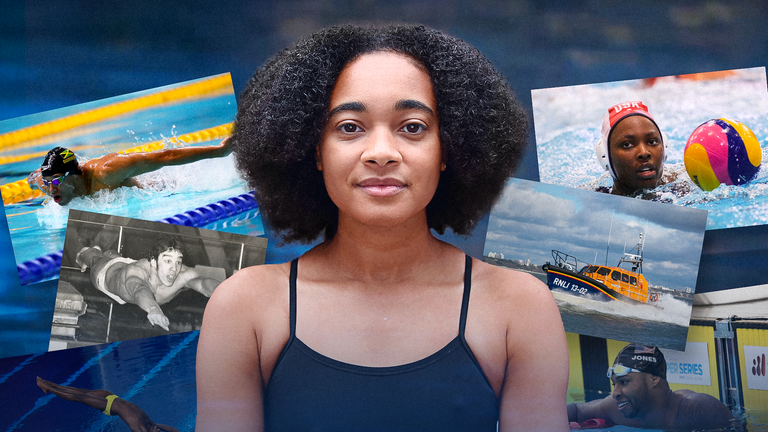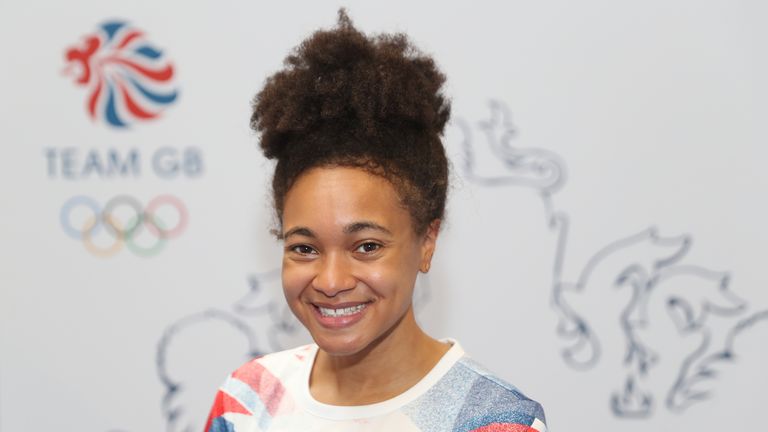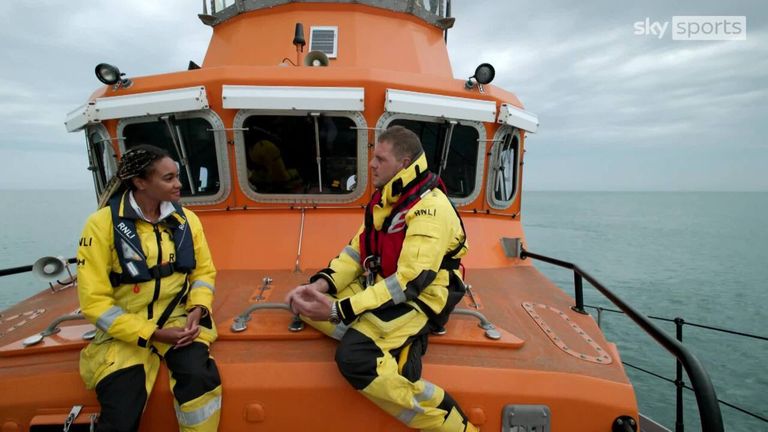Black History Month: Why do so few people from Black and Asian communities swim?
Aquaphobia explores why many people in Black and Asian communities in the UK do not swim; Alice Dearing presents documentary looking at myths, barriers, swimming as a life-saving skill, trailblazers in elite swimming, the next generation; and if other aquatic sports can inspire change
Thursday 13 October 2022 12:42, UK
Aquaphobia, a new documentary, investigates inequalities in water and why so few people from Black and Asian communities swim. It explores myths and stereotypes, swimming as a life-saving skill, speaks to trailblazers and looks at the next generation to see if there will be more diversity in elite swimming.
The four-part series is presented by Alice Dearing, who in 2021 became the first Black female British swimmer to compete at the Olympics. As a co-founder of the Black Swimming Association, Dearing travels around the country to listen to a variety of first-hand experiences.
The statistics from Sport England show 95 per cent of Black adults do not swim and 80 per cent of Black children do not swim. For the Asian communities, it is 93 per cent and 78 per cent respectively. Why are so few people deciding to swim?
Dearing looks at myths and stereotypes surrounding diversity in swimming and aquatics. The documentary explores barriers and the real-life experiences of a range of people from researchers, athletes, coaches, volunteers and campaigners.
The impact of people not knowing how to swim also has tragic consequences worldwide. The World Health Organisation says drowning is one of the leading causes of death globally for young people. What is being done to save lives by organisations and communities in 2022?
The lack of diversity in participation is also reflected in elite swimming. The documentary hears the experiences of the few diverse trailblazers in swimming and meets the next generation of British athletes hoping to create history. It also looks at other aquatic sports to see how much progress is being made and how the future could be very different.
Episode One
The first part looks at the history of diversity in swimming and Professor Mike Tipton from the University of Portsmouth explains the groundbreaking work being done to investigate the factors that affect an ability of someone to swim including bone density.
The relationship with water for Black communities is investigated and Dearing looks at the history to see if that could be a factor in explaining the inequalities in swimming. Researcher Dr Tiffany Quash from Washington talks about how Black women interact with water and how she is raising awareness in the United States.
Hairstylist Suzette Pires explains why using chlorine in swimming pools is a barrier for many Black people while Danielle Obe, chair of the Black Swimming Association, explains what the organisation is trying to achieve and how they might create permanent change.
And former Jamaican-British swimmer Michael Gunning reveals his personal journey from childhood to elite swimming to see if there are any familiar themes stopping people like him to swim.
Episode Two
Part two looks at swimming as a life-saving skill and hears the story of Jennifer Holmes whose 13-year-old son Genesis Holmes drowned in the summer of 2014.
Dearing travels to Newhaven in Sussex to meet The Royal National Lifeboat Institution (RNLI) to learn about their work to save lives in water and get safety advice for anyone who is in danger in water. We also see the work being done in communities by The Royal Life Saving Society who want to save lives as volunteer Bhavik Barochia explains how they are helping people being in, on or around water.
Abena Gray is one of the few ethnically diverse people to be a swim school owner. Working with children and with over a decade of experience empowering children and adults she has a unique position to analyse Aquaphobia. Episode two also hears from parents who explain why they have brought their children for swimming lessons and explain how it was different for their generation.
Episode Three
Kevin Burns made history at the Montreal Olympics in 1976 when he became the first Black British swimmer to compete at the Olympics. In an exclusive interview, he recalls how an accident helped him to take up swimming and make history. He explains why every child should be taught to swim.
Cullen Jones is a double Olympic champion from the United States whose first gold medal was alongside Michael Phelps in the 4×100-metre freestyle relay. He recalls his rise to elite swimming and the role his parents played as he grew up.
At Manchester Aquatics Centre we hear from Jessica Calderbank and Reuben Rowbotham-Keating who are aiming to be the next generation of Black elite swimmers to compete at the Paris Olympics in 2024.
And with inclusivity in swimming in the spotlight recently, we speak to the co-founders of Soul Cap who design caps specifically for afro hair. Fina, the governing body for water sports, reversed their decision last month which means the caps are now allowed in elite-level competitions. Will it be the start of making swimming more inclusive and more equal for all?
Episode Four
The final part of the documentary looks at other aquatic sports outside swimming to see what progress is being made and if anything might change in the near future.
It features interviews with British 2012 Paralympic bronze medallist sailor Alexandra Rickham and Kieran Langridge from London Youth Rowing who explains how his organisation has brought a sport to diverse young children despite its reputation as being for a small elite group. There is an interview with Yona Knight-Wisdom who is the first Jamaican male diver at an Olympics.
And we meet Adya Misra who took it upon herself to make water more accessible for people from all marginalised communities including her own South Asian community. What is the impact of initiatives like this and how much of a difference will they make?
Watch all four parts of Aquaphobia presented by Alice Dearing in the story above. You can also watch it on Sky Sports Main Event at 10pm on Monday October 17 and throughout Black History Month.





